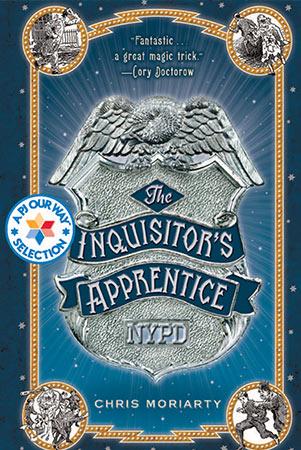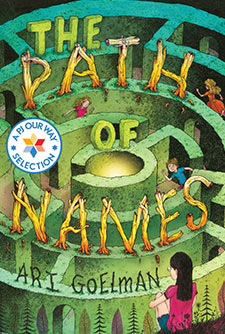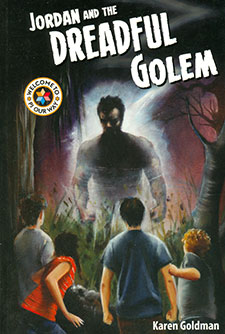The Inquisitor's Apprentice
Meet Sacha Kessler – a Jewish boy fighting corruption! The day Sacha discovers he can see witches is one of the worst days of his life. But Sacha's newfound magical abilities get him apprenticed to New York City's star Inquisitor, and their first case is to find out who wants to kill Thomas Edison. Aside from finding out there are powerful forces even from within the police stealing magic from downtrodden communities, what could possibly go wrong?
Average Rating
( hint: Login to leave a review! )
139 Reviews
Leave Review
What the Book is About
Jewish Content & Values
Positive Role Models
Content Advisory
Talk it Over!
More for You
What the Book is About
The Inquisitor’s Apprentice presents an alternative, magical reality with the colorful backdrop of turn-of-the-century New York. Neighborhoods like the Lower East Side, the Bowery, and Chinatown are not only divided along ethnic and class lines, but also according to magical skill and expertise, and they are policed by the Inquisitor Squad which monitors magical crimes.
Because of his unusual ability to detect magic, Sacha finds himself apprenticed to Maximilian Wolf, New York’s smartest Inquisitor. Sacha is joined by the wealthy and privileged Lily Astral (based on the famous Astors), and together they attempt to identify the person trying to murder Thomas Edison. As Lily and Sacha fit the pieces of this magical puzzle together, they meet Harry Houdini, Teddy Roosevelt, and the cunning and sly Wall Street Wizard, J.P. Morgaunt. However, they soon discover that even among the Inquisitors there are powerful forces attempting to steal magical abilities from the most vulnerable communities in the city. This is a timely tale of corruption and justice and how with the right tools everyone can take action.
Jewish Content & Values
- Apart from the magical elements, Jewish life on Hester Street in the Lower East Side is accurately depicted. Large families live in small and decrepit tenements, yet there is warmth, good conversation, and familial loyalty. Jewish holidays like Hanukkah and Shabbat are celebrated.
- While Lily enjoys New York street food, Sacha avoids eating anything that might not be kosher (conforming to Jewish dietary laws).
- When Sacha meets Rabbi Mendelson, he observes the rabbi’s relationship with God: “People on Hester Street treated God like a member of the family.”
- Sacha’s grandfather is an expert in kabbalah (Jewish mysticism). When Sacha wants to destroy the dybbuk (ghost) he uses kabbalah to help him.
- Sacha notices that the advertisement for Thomas Edison’s invention demonizes magicians and is evocative of anti-Semitic propaganda.
- Many Yiddish words are used; Uncle Mordechai acts in the Yiddish theatre.
Positive Role Models
- Sacha stays loyal to his family while working hard to help Inquisitor Wolf. He is brave, humble, and open-minded. He originally hides the fact that he is from an immigrant Jewish family and lives in the tenements, but he ultimately learns to be proud of his identity.
- Mrs. Kessler, Sacha’s mother, suffered through pogroms in Russia and lost a baby on the family’s journey to America, but she always shows a positive, strong face to her family.
- Lily is a spunky and intelligent girl. She wins a baseball dare against some bullies in a great girl-power scene.
Content Advisory
Like the Harry Potter series, The Inquisitor’s Apprentice explores the cold and dangerous side of magic. Throughout the story, a dybbuk haunts Sacha and causes death and injury to innocent people. There’s a creepy rag and bone man who makes a few appearances. Some offensive terms like “piss poor shanty Irish” are used, while kids are unlikely to notice the occasional innuendoes such as “ogling a peep show” and “better ways to pass the time without socks on.”
Talk It Over!
Sacha is afraid to reveal his identity to Maximillian Wolf. A lie that he tells about his family not being Kabbalists creates even more lies that soon end up endangering his life. Have you ever told a lie that got you into trouble? Do you think there is ever a situation where lying might be acceptable?
More for You
Kabbalah is the Jewish mystical tradition that has developed over centuries to address basic questions of God’s existence and the hidden and esoteric power of Torah and mitzvot (Jewish laws). Throughout Jewish history, the study of Kabbalah was reserved for the most learned and was often seen as controversial. Today, the definition of Kabbalah has expanded and is sometimes associated with “new age” and the occult.
What the Book is About
What the Book is About
The Inquisitor’s Apprentice presents an alternative, magical reality with the colorful backdrop of turn-of-the-century New York. Neighborhoods like the Lower East Side, the Bowery, and Chinatown are not only divided along ethnic and class lines, but also according to magical skill and expertise, and they are policed by the Inquisitor Squad which monitors magical crimes.
Because of his unusual ability to detect magic, Sacha finds himself apprenticed to Maximilian Wolf, New York’s smartest Inquisitor. Sacha is joined by the wealthy and privileged Lily Astral (based on the famous Astors), and together they attempt to identify the person trying to murder Thomas Edison. As Lily and Sacha fit the pieces of this magical puzzle together, they meet Harry Houdini, Teddy Roosevelt, and the cunning and sly Wall Street Wizard, J.P. Morgaunt. However, they soon discover that even among the Inquisitors there are powerful forces attempting to steal magical abilities from the most vulnerable communities in the city. This is a timely tale of corruption and justice and how with the right tools everyone can take action.
Jewish Content & Values
Jewish Content & Values
- Apart from the magical elements, Jewish life on Hester Street in the Lower East Side is accurately depicted. Large families live in small and decrepit tenements, yet there is warmth, good conversation, and familial loyalty. Jewish holidays like Hanukkah and Shabbat are celebrated.
- While Lily enjoys New York street food, Sacha avoids eating anything that might not be kosher (conforming to Jewish dietary laws).
- When Sacha meets Rabbi Mendelson, he observes the rabbi’s relationship with God: “People on Hester Street treated God like a member of the family.”
- Sacha’s grandfather is an expert in kabbalah (Jewish mysticism). When Sacha wants to destroy the dybbuk (ghost) he uses kabbalah to help him.
- Sacha notices that the advertisement for Thomas Edison’s invention demonizes magicians and is evocative of anti-Semitic propaganda.
- Many Yiddish words are used; Uncle Mordechai acts in the Yiddish theatre.
Positive Role Models
Positive Role Models
- Sacha stays loyal to his family while working hard to help Inquisitor Wolf. He is brave, humble, and open-minded. He originally hides the fact that he is from an immigrant Jewish family and lives in the tenements, but he ultimately learns to be proud of his identity.
- Mrs. Kessler, Sacha’s mother, suffered through pogroms in Russia and lost a baby on the family’s journey to America, but she always shows a positive, strong face to her family.
- Lily is a spunky and intelligent girl. She wins a baseball dare against some bullies in a great girl-power scene.
Content Advisory
Content Advisory
Like the Harry Potter series, The Inquisitor’s Apprentice explores the cold and dangerous side of magic. Throughout the story, a dybbuk haunts Sacha and causes death and injury to innocent people. There’s a creepy rag and bone man who makes a few appearances. Some offensive terms like “piss poor shanty Irish” are used, while kids are unlikely to notice the occasional innuendoes such as “ogling a peep show” and “better ways to pass the time without socks on.”
Talk it Over!
Talk It Over!
Sacha is afraid to reveal his identity to Maximillian Wolf. A lie that he tells about his family not being Kabbalists creates even more lies that soon end up endangering his life. Have you ever told a lie that got you into trouble? Do you think there is ever a situation where lying might be acceptable?
More for You
More for You
Kabbalah is the Jewish mystical tradition that has developed over centuries to address basic questions of God’s existence and the hidden and esoteric power of Torah and mitzvot (Jewish laws). Throughout Jewish history, the study of Kabbalah was reserved for the most learned and was often seen as controversial. Today, the definition of Kabbalah has expanded and is sometimes associated with “new age” and the occult.




